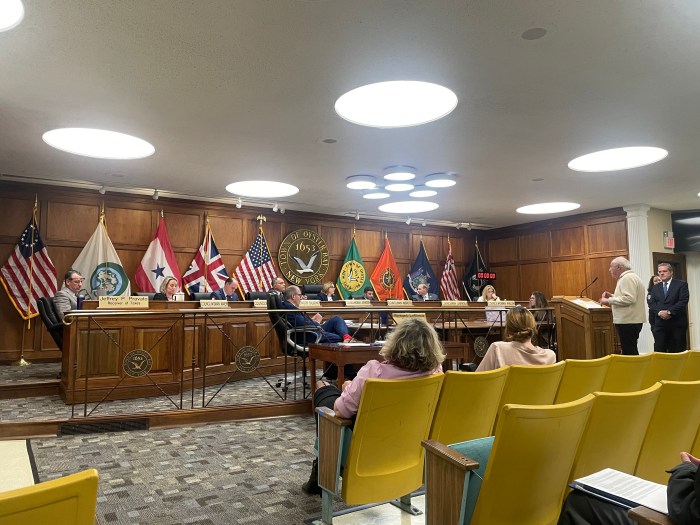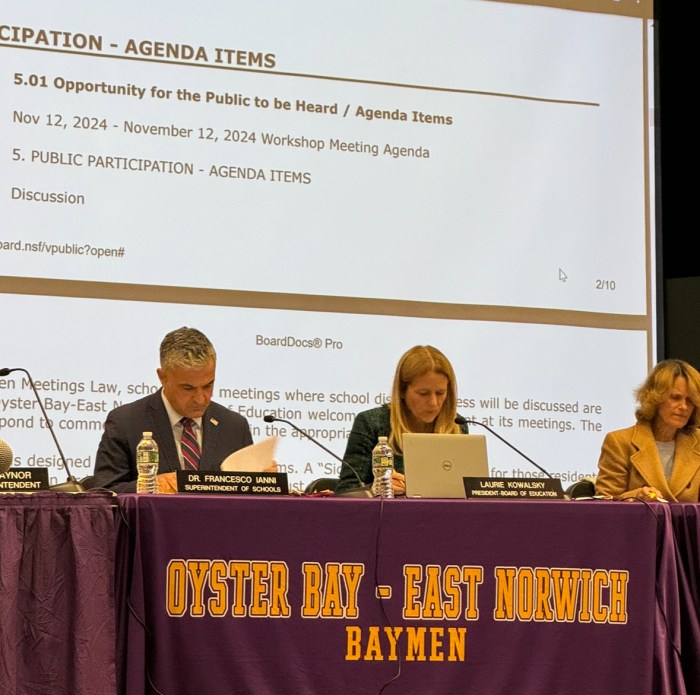
The last retirement incentive program was judged a success, so the Town of Oyster Bay will continue with a good thing.
The Oyster Bay Town Board, at its March 13 meeting, passed two local laws to initiate another round of both an early retirement and a voluntary separation programs.
Combined, according to Supervisor Joseph Saladino, they will help trim the workforce and save taxpayers’ money.
“This is responsible governing as we move forward to reorganize, right-size the workforce and provide the high quality service at less of a cost,” he said.
Retirement is limited to full-time employees who have put in a required number of years and are 55 and older. They will get $1,000 per completed year of service plus free health insurance for life (as per state mandate and agreements with the Civil Service Employees Union), including family members.
Voluntary separation is for any full-time employee who is not otherwise eligible for retirement, and began employment before Jan. 1, 2016. If they choose to participate, they will get $1,000 per year of completed employment, but no health insurance.
In both situations, employees would need to provide to the Department of Human Resources an irrevocable letter of resignation.
Councilman Anthony Macagnone expressed annoyance that the issue had come up again, after he was promised (at the Nov. 28 meeting) that it would not be revisited for at least six months.
Department of Human Resources Deputy Commissioner Vicky Spinelli told trustees that the last round of incentives—passed by the board last Nov. 28—did not give employees enough time to decide, as they needed to respond by the last working day of the year, Dec. 29. Macagnone agreed that it was a short window.
Members of the workforce asked for an extension, and the current plan covers the period from Jan. 1 to June 30, 2018.
As Spinelli explained last November, those who were already eligible to retire but did not retire under previous incentive periods will be offered $500 per year of service plus lifetime health insurance.
The early retirement incentive had been spurred by the town’s financial problems and initiated under the administration of John Venditto, who resigned in January 2017.
The combination of layoffs, attrition and early retirement has reduced the town’s payroll to a shade under 1,000—at least a 20 percent reduction from its high mark earlier this decade.
Means and Ends
For both those who plan to retire early, or separate from the town, and cannot declare their intention by the June 30, 2018 deadline, there is a way around this obstacle. Through human resources, they can ask for a waiver (in the case of retirement) or deferment (for separation). They would then have until July 1, 2019 to leave the town after giving appropriate notice.
Councilwoman Rebecca Alesia asked Spinelli for a circumstance under which an employee would ask for a waiver.
Spinelli replied, “If they are hitting a retirement milestone. So that leaving six months early would be a great penalty to them. We don’t want to hurt people if they have worked here a long time. So [with the waiver] we would allow them to stay until they hit that milestone and retire under the incentive.”
Much of the board discussion on March 13 revolved around whether the supervisor only—or the entire board—should have the power to rule on a waiver/deferment.
Both Macagnone and Alesia noted that the trustees voted on all other personnel decisions. Why make an exception for these special situations?
After a lengthy and at times heated debate, Macagnone declared that he was fine with the human resources commissioner—or a designated deputy—making the decision. Saladino said he wasn’t opposed to that, and Chief Deputy Town Attorney Frank Scalera said the wording of the proposed laws would be changed accordingly.
Only Macagnone voted against the voluntary separation law, again saying he did not expect to have to vote on it so soon. The retirement program, by contrast, passed unanimously.
Saladino emphasized again that the workers had asked for it and the civil service union had given its consent.
Councilman Joseph Muscarella asked Spinelli if she could estimate how many current employees had expressed an interest in taking advantage of the early retirement incentive.
Spinelli turned to Director of Finance Rob DaRienzo, who stated the number at between 20 and 30.
The Numbers
According to Marta Kane, town spokeswoman, “42 employees participated in the most recent early retirement program. Their salaries totaled approximately $3.8 million. We estimate retirement costs as 20 percent of salary, so that’s another $760,000. FICA is 7.65 percent of salary so that’s $290,000. In total, this program will save taxpayers $4.85 million as employees come off the payroll. Remember, those retiring often have some of the highest compensation costs.”
Employees had to file—by Dec. 31, 2017—their intent to retire, with their last day of work no later than Jan. 31, 2018.































